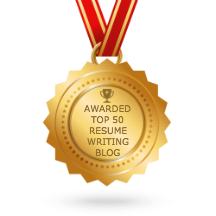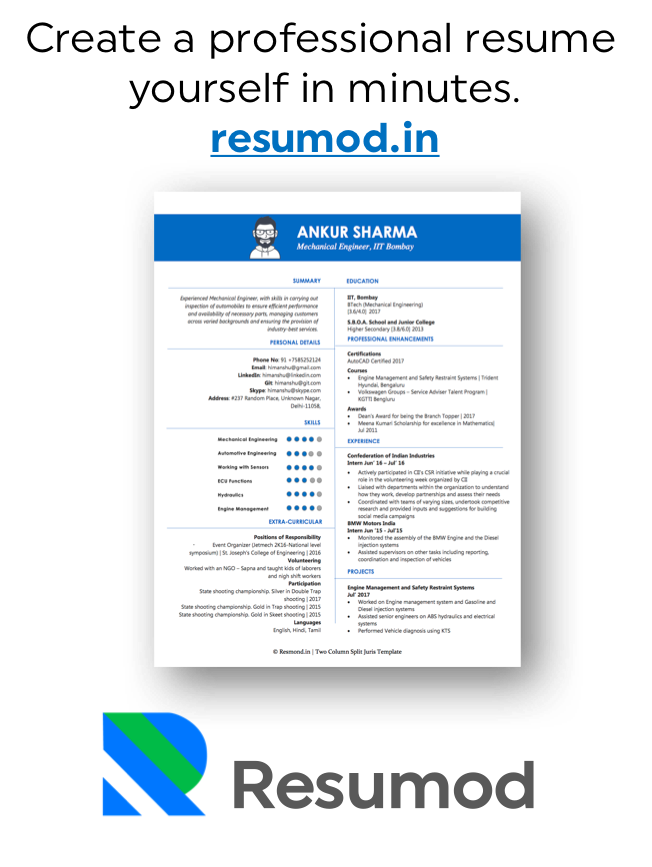RESUME
Etymology: Resume is a French word meaning “summary”.
A resume is ideally a summary of one’s education, skills and employment when applying for a new job. A resume does not list out all details of a profile, but only some specific skills customized to the target job profile. It thus, is usually 1 or at the max 2 pages long. A resume is usually written in the third person to give it an objective and formal tone.
Structure: A good resume would start with a Brief Profile of the candidate, Summary of Qualifications, followed by Industry Expertise and then Professional Experience in reverse chronological order. Focus is on the most recent experiences (with responsibilities and accomplishments), and previous experiences are only presented as a summary. This would be followed by Education details and/or Professional Affiliations and/or Voluntary Initiatives.
Resume
- 1 or 2 pages max
- Lists important KRAs or OKRs from the last 10 years
- Lists only relevant and active certifications
- Customised to a target job description
- Written in a neutral or third person tone
- Most Important Information: Full Name, Contact Details, Experience in reverse-chronological order, Education details, Professional Skills & Certifications
- Not required: Date of Birth, Gender, Fathers name, Nationality, Hobbies, Declaration.
CV – CURRICULUM VITAE
Etymology: Curriculum Vitae is a Latin word meaning “course of life”.
Your CV is more detailed than a resume, generally 2 to 3 pages, or even longer as per the requirement. A C.V. lists out every skill, all the jobs and positions held, degrees, professional affiliations the applicant has acquired, and in chronological order. A CV is used to highlight the general talent of the candidate rather than specific skills for a specific position. CVs talk about your entire career ever since you graduated. So if you have 20 years of experience, your CV will have details of the entire 20 years even if it means a 10 page document.
CV
- No limit on the pages
- Lists important KRAs or OKRs from the entire tenure
- Lists all skills and certifications held (also expired)
- Customised for a larger audience and not for a specific job description
- Written in a first, neutral or third person tone
- Most Important Information: Full Name, Contact Details, Short Bio, Education details, Experience in chronological order, Professional Skills & Certifications, Interests, Courses, Publications, References
- Not required: Date of Birth, Gender, Fathers name, Nationality, Hobbies, Declaration.
BIO-DATA
Etymology: Biodata is the short form for Biographical Data and is an archaic terminology for Resume or C.V. This term is mostly used in India by people who started their careers back in the 60s, 70s, and 80s.
Since it is an archaic term, Biodatas are not used in a career oriented field anymore. Our parents used to share their biodata when they would go for interviews back in the 70s. Nowadays, Biodata has a reference mostly in case of arranged (or love) marriages where parents ask for it from the other party.
In a bio data, the focus is on personal particulars like date of birth, gender, religion, race, nationality, residence, marital status, and the like. A chronological listing of education and experience comes after that but only to show what a person has done, it is not for the purpose of a job.
In some South Asian countries (e.g. Bangladesh) it may be used in the place of a resume. A biodata form is also required when applying for government, or defence positions.
Biodata
- No limit on the pages
- Focus on Date and Time of Birth, gender, religion, race, nationality, residence, marital status
- Customised for the purpose of marriages
- Written in a first or third person tone
- Education & Experience: not mandatory
- Salary details: mandatory if using for matrimonial purposes 🙂
Writing a marriage bio-data? Read this post here
To summarize
– A resume would be ideally suited when experience people apply for specific positions where certain specific skills are more important than education.
– A CV, on the other hand should be the preferred option for fresh graduates or people looking for a career change. It could also be used by people applying for academic positions. or if specifically asked to apply with a CV instead of a Resume.
– The term bio-data is mostly used in some South Asian countries when people apply for government jobs, or for research grants where one has to submit descriptive essays. Bio Datas are not common in the international markets where personal information like age, gender, religion are not required to be submitted by candidates.




Great post! Have nice day ! 🙂
Very well explained
Hey there! This is my first comment here so
I just wanted to give a quick shout out and say I genuinely enjoy reading your posts.
Hello,I log on to your blogs named “Difference between Resume, C.V. and BioData | GetSetResumes.com Blog” on a regular basis.Your humoristic style is awesome, keep it up!
thanks
very good explaination
Tnq sir
Thanks sir
Thank you, very well exaplainecd.
thanks bro, I am interested on it.
Finally i got the difference between the cv and resume. Many people are thinking that cv and resumes are same. I was always thinking that cv and resume both are same but now its clear. thanks for sharing with us.
Thanks a lot for this article as i was searching for this kind of information and i always got confused that what is the exact difference between Resume and CV but after reading this article my doubt got cleared and i got detailed information on this topic, now it will be easier to create CV or Resume for myself.Thank You. Going to bookmark this for sure.
Thankful to know about this.
very helpfull! Thank you!
Thanks a lot for this…very helpful
Hi..
Great article very impressive and simple to understand the difference between both I think people hardly know the difference between CV and Resume they should read your blog and go according to it to improve there selfs..
Thanks a lot for your post.
Hi..
Nice article..Very impressive to know about the difference between CV and resume I hardly knew what was the difference I use to think both are equal only have different names, but your article washed my mind
Thanks for posting..!!
thanks bro
Hey Great article..
I am a fresher and going to prepare my first resume,but I was very confused on what is best for freshers resume or CV thanks to your blog to solve my confusion.
Thank You..!
so that’s it! thanks for the info…
good article… Got what I was looking for…
Great article. You can also try resumod.in for building your resume in minutes.
I visited various web pages however the audio quality for audio songs
current at this site is really marvelous.
Thanks for a very informative blog. What else may I get that kind of information written in such an ideal means? I have a venture that I am simply now operating on, and I’ve been at the lookout for such info.
As a website owner, I believe the material here is really excellent. I thank you for your time. You should keep it up forever! Good Luck.
Hello, I enjoy reading all of your post. I wanted to write a little
comment to support you.
Its very well written; I love what youve got to say.
great write up!
Just wanted to say excellent blog!
Wow, this post is nice, my younger sister is analyzing these things, therefore I am going to
inform her.
Great article.
Awesome, concise and fully informative.
Concise and informative.